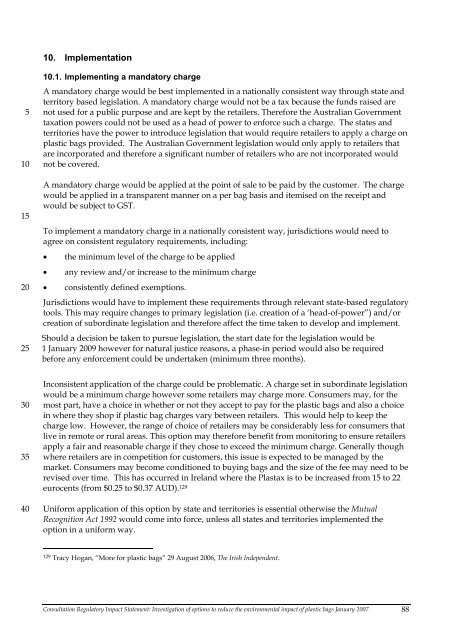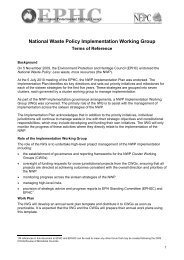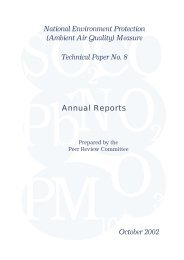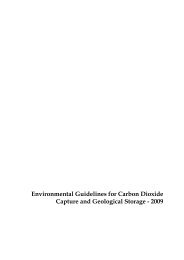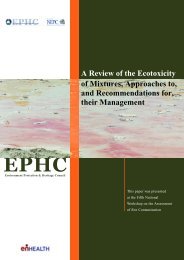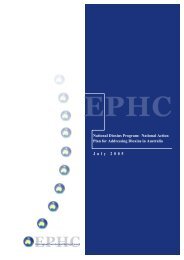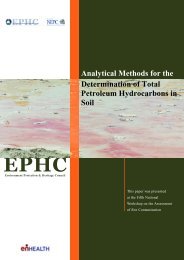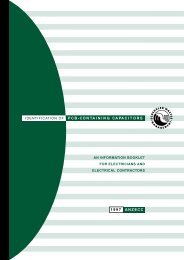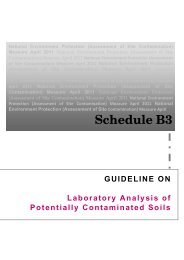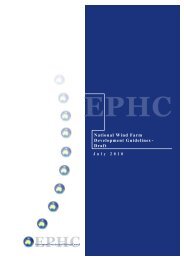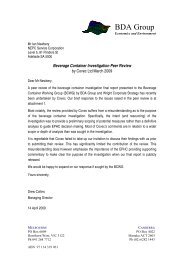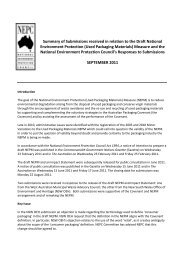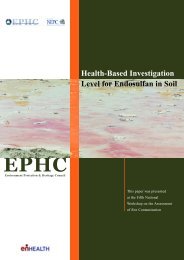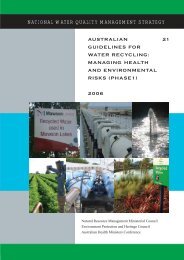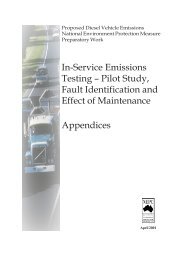Plastic Bags - COAG Standing Council on Environment and Water
Plastic Bags - COAG Standing Council on Environment and Water
Plastic Bags - COAG Standing Council on Environment and Water
You also want an ePaper? Increase the reach of your titles
YUMPU automatically turns print PDFs into web optimized ePapers that Google loves.
10. Implementati<strong>on</strong><br />
5<br />
10<br />
15<br />
20<br />
25<br />
10.1. Implementing a m<strong>and</strong>atory charge<br />
A m<strong>and</strong>atory charge would be best implemented in a nati<strong>on</strong>ally c<strong>on</strong>sistent way through state <strong>and</strong><br />
territory based legislati<strong>on</strong>. A m<strong>and</strong>atory charge would not be a tax because the funds raised are<br />
not used for a public purpose <strong>and</strong> are kept by the retailers. Therefore the Australian Government<br />
taxati<strong>on</strong> powers could not be used as a head of power to enforce such a charge. The states <strong>and</strong><br />
territories have the power to introduce legislati<strong>on</strong> that would require retailers to apply a charge <strong>on</strong><br />
plastic bags provided. The Australian Government legislati<strong>on</strong> would <strong>on</strong>ly apply to retailers that<br />
are incorporated <strong>and</strong> therefore a significant number of retailers who are not incorporated would<br />
not be covered.<br />
A m<strong>and</strong>atory charge would be applied at the point of sale to be paid by the customer. The charge<br />
would be applied in a transparent manner <strong>on</strong> a per bag basis <strong>and</strong> itemised <strong>on</strong> the receipt <strong>and</strong><br />
would be subject to GST.<br />
To implement a m<strong>and</strong>atory charge in a nati<strong>on</strong>ally c<strong>on</strong>sistent way, jurisdicti<strong>on</strong>s would need to<br />
agree <strong>on</strong> c<strong>on</strong>sistent regulatory requirements, including:<br />
• the minimum level of the charge to be applied<br />
• any review <strong>and</strong>/or increase to the minimum charge<br />
• c<strong>on</strong>sistently defined exempti<strong>on</strong>s.<br />
Jurisdicti<strong>on</strong>s would have to implement these requirements through relevant state-based regulatory<br />
tools. This may require changes to primary legislati<strong>on</strong> (i.e. creati<strong>on</strong> of a ‘head-of-power”) <strong>and</strong>/or<br />
creati<strong>on</strong> of subordinate legislati<strong>on</strong> <strong>and</strong> therefore affect the time taken to develop <strong>and</strong> implement.<br />
Should a decisi<strong>on</strong> be taken to pursue legislati<strong>on</strong>, the start date for the legislati<strong>on</strong> would be<br />
1 January 2009 however for natural justice reas<strong>on</strong>s, a phase-in period would also be required<br />
before any enforcement could be undertaken (minimum three m<strong>on</strong>ths).<br />
30<br />
35<br />
40<br />
Inc<strong>on</strong>sistent applicati<strong>on</strong> of the charge could be problematic. A charge set in subordinate legislati<strong>on</strong><br />
would be a minimum charge however some retailers may charge more. C<strong>on</strong>sumers may, for the<br />
most part, have a choice in whether or not they accept to pay for the plastic bags <strong>and</strong> also a choice<br />
in where they shop if plastic bag charges vary between retailers. This would help to keep the<br />
charge low. However, the range of choice of retailers may be c<strong>on</strong>siderably less for c<strong>on</strong>sumers that<br />
live in remote or rural areas. This opti<strong>on</strong> may therefore benefit from m<strong>on</strong>itoring to ensure retailers<br />
apply a fair <strong>and</strong> reas<strong>on</strong>able charge if they chose to exceed the minimum charge. Generally though<br />
where retailers are in competiti<strong>on</strong> for customers, this issue is expected to be managed by the<br />
market. C<strong>on</strong>sumers may become c<strong>on</strong>diti<strong>on</strong>ed to buying bags <strong>and</strong> the size of the fee may need to be<br />
revised over time. This has occurred in Irel<strong>and</strong> where the Plastax is to be increased from 15 to 22<br />
eurocents (from $0.25 to $0.37 AUD). 129<br />
Uniform applicati<strong>on</strong> of this opti<strong>on</strong> by state <strong>and</strong> territories is essential otherwise the Mutual<br />
Recogniti<strong>on</strong> Act 1992 would come into force, unless all states <strong>and</strong> territories implemented the<br />
opti<strong>on</strong> in a uniform way.<br />
129 Tracy Hogan, “More for plastic bags” 29 August 2006, The Irish Independent.<br />
C<strong>on</strong>sultati<strong>on</strong> Regulatory Impact Statement: Investigati<strong>on</strong> of opti<strong>on</strong>s to reduce the envir<strong>on</strong>mental impact of plastic bags January 2007 88


